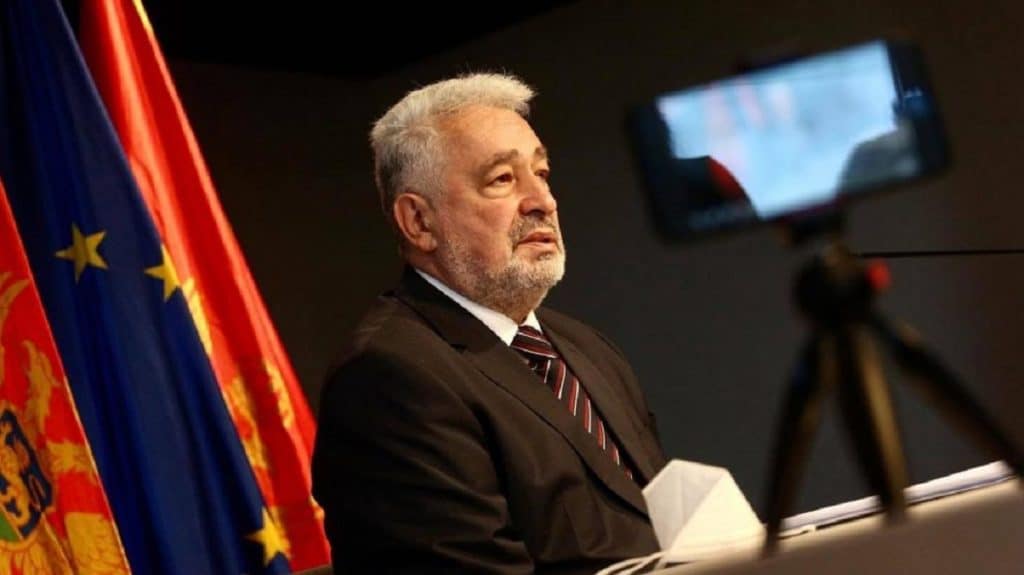By Slaviša Batko Milačić
Parliamentary elections in Montenegro were held on August 30th, and the result of those elections were historic for both the citizens of Montenegro and for democracy in the Balkans.

After thirty years in power, the Democratic Party of Socialists, a party that promoted crime, corruption and, at the end of its rule, fascism, went into opposition. In addition to the will of the people, an important role in overthrowing the Democratic Party of Socialists was played by Serbia, Germany and the United States. However, after only 15 days, the post-election euphoria was replaced by a serious concern because there was blackmail during the formation of the new government.
The main responsibility for the post-election turmoil lies with the political movement URA. The “idea“ of the URA movement, which won 5.5% in the elections, was that the new government should be “expert” – without the participation of politicians. Prime Minister Krivokapić unreservedly supported this proposal. This idea may be the best in theory, but in practice it is difficult to maintain it.
Bearing in mind that human society is imperfect, and that all our Montenegrin imperfections are additionally distorted by the three-decade dictatorship of Milo Đukanović, in addition to “experts“, the new government equally needs political legitimacy. The interests of political parties, which are often opposed to the interests of ordinary citizens and society as a whole, are an unchanging constant that Prime Minister Krivokapić had to take into account. Negotiations with so many conflicting interests and external influences were undoubtedly difficult to conduct, but Prime Minister Krivokapić accepted the historical responsibility. Instead of taking into account the wishes of all factors and offering a compromise based on them, he decided to unconditionally support the positions of the URA movement.
In the given circumstances, when the former regime controls the government in the largest cities for another year and a half and when the president of Montenegro is still Milo Djukanovic for another two and a half years, forming an unstable government without any foundations in the Assembly it`s not wise. The only thing that can keep the government conceived in this way is the assessment of 5-6 parties that they will not get more in the new elections than they have now. When the first political group estimates that it will win more in the new elections, the government of Zdravko Krivokapić will fall.
A few days after the parties that the people trusted to liberate the country from Democratic Party of Socialists regime and a few hours after declaring that there would be no candidates from the parliamentary lists, Prime Minister Krivokapic shocked the public by proposing that the leader of the URA movement, Dritan Abazovic, will be the coordinator of the security services, which means that the leader of the weakest party will control the entire security sector.
In this way, Krivokapic significantly devalued the credibility of his promises and before he formally became prime minister, he unnecessarily put his finger in the eyes of other parties that should support the formation of the government and which have many times more political weight than Abazovic, and directly demonstrated that accusations of the leader of the Democratic Front, with whom he appeared together in the coalition “For the Future of Montenegro”, that he represents exclusively the interests of the URA movement are justified.
However, an additional shock was the knowledge that some ministers would in fact be people who held high positions during the rule of the Democratic Party of Socialists.
Thus, the current Minister of Foreign Affairs of Montenegro Djordje Radulovic has almost a decade of work experience in the Foreign Affairs ministry. Scandals are not connected to his name, however the fact that he reached a high position during the ministry of Srdja Darmanovic, who shamelessly slandered Serbia and Russia, expelled Russian diplomats, regularly voted against the interests of Russia and Serbia in international organizations, cannot be a plus in Radulović’s biography. Because the main voters of the current government want the closest possible relations with Serbia.
That is why Krivokapic must solve a very important issue very quickly. For years, the data showed that there is a high level of discrimination regarding national representation in state bodies and institutions, so in 2016, only 7.30 percent of Serbs were employed in state bodies, although about a third of Montenegrin citizens declare themselves as Serbs.
“The national structure of employees in state bodies and state administration bodies, according to the research of the Montenegrin Ministry of Human and Minority Rights, has shown that, out of the total number, ie. out of 6,808 questionnaires, in the national sense, employees declared as: Montenegrins 5,590 (82.11%), Serbs 497 (7.30%), Albanians 90 (1.32%), Bosniaks 333 (4.89%), Muslims 149 (2.19%), Roma 2 (0.03%), Croats 27 (0.40), others 24 (0.35%) while 96 of them (1.41) did not declare themselves ”.
Serbs in previous governments were not in the leading positions, they were not among the ministers or among any leading staff. Also, the doors were closed for Serbs in the security sector, and there were no Serbs in the Special Anti-Terrorist Unit. There was no place for Serbs neither in the Montenegrin intelligence service.
It should be borne in mind that the Serbs were the main force that overthrew the Democratic Party of Socialists and that if the demands of the Serbs are not met, the current Government of Montenegro will be short-lived. And Serbs in Montenegro do not have special requirements, all their requirements are in line with European norms. And that primarily refers to the proportional representation of Serbs in the state administration. Unfortunately, four months have passed since the elections in Montenegro and there has been no progress in that area. That is why Serbs in Montenegro are becoming more impatient, as are their political representatives. If the government of Zdravko Krivokapic does not make progress on this issue in the near future, early elections will become inevitable.
Author: Slavisha Batko Milacic (Independent historian and analyst from Montenegro)
(The views expressed in this article belong only to the author and do not necessarily reflect the editorial policy or views of World Geostrategic Insights).







